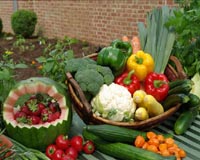 |
Vancouver, Canada (AFP) June 15, 2009 The succulent braised rabbit served up at Raincity Grill comes garnished with a mound of curled wild lettuce, harvested from the mountains surrounding Vancouver. In fact, the rabbit itself -- and nearly every other menu item at this trendy beachside restaurant -- is from a nearby farm or producers' market. This west coast Canadian city is a mecca for so-called "locavores" who eat seasonal, locally-sourced fare rather than industrially-farmed meat and produce, which sometimes can be shipped from thousands of miles away. They do it because they believe that eating local cuts down on carbon emissions, is healthier, and supports the local economy. Raincity Grill's chef, who features food almost exclusively from the British Columbia region, even has designed a unique tasting menu featuring ingredients from within a one-hundred mile radius of his popular restaurant. The result, said acclaimed chef Peter Robertson, is food that is fresher, tastier -- and he knows it was grown in a sustainable way. "The whole local concept is just common sense," said Robertson. "As a chef, I think it's really important to get to know your produce, how it's farmed, and who farms it," he said. The movement comes in tandem with other efforts across North America to promote locally grown food whenever possible. Across the United States and Canada, the number of urban gardens has been growing, and the number of farmers markets across America has risen from 1,755 in 1994 to 4,700 today, according to US government figures. Canada has more than 500 such markets, a 30 percent increase in the past five years according to Farmers' Markets Canada. But locavore chefs say even locally grown produce won't be welcome in their kitchens if grown in greenhouses or hot houses, since these methods consume large amounts of fossil fuels. Anyone fearing that restricting ingredients to local fare would mean severely limiting menu options might be surprised by the variety as the seasons change. "It's dizzying. You can't keep up," said Raincity Grill manager Gavin Stevenson, as he delivers a plate of salmon, watercress and hazelnuts -- the ingredients all from nearby Bruce Swift Farm, just a 90-minute drive from the restaurant. Andrew Rushmere, academic coordinator at the University of British Columbia's teaching and research farm, said another dividend of locavore living is a greater sense of connectedness to the land as a source of nourishment. "Increasingly people are living in urban areas and are very disconnected from their food, and where it comes from, and the ecological and health impacts associated with our current industrial model," said Rushmere. The 24-hectare (60-acre) farm at the edge of Vancouver supplies produce to several restaurants in this city of approximately 580,000 people. Despite the benefits, even the staunchest advocates concede that eating locally can require that diners and food shoppers make a mental shift. "People could not expect to eat strawberries in December," Rushmere said. "They would need to eat strawberries in June when they are in season and maybe turn some into jam or can them or freeze them," he said. Despite the benefits of eating local, though, economists warn that Canada and the US have too many mouths to feed to avoid long distance, industrially farmed foods. "Having the organic and locals as choices is fine," said John Lawrence, a professor of agriculture economics at Iowa State University, but it can't replace the current food system. He explained that some regions have comparative advantages in terms of soil quality and climate, and can produce food more efficiently -- economically and environmentally -- than if each region tried to produce all of its own products. And even locally-sourced restaurants sometimes have to resort to foreign sources for such essentials as coffee and cooking oil, which often cannot be produced locally. "We try to stay away from citrus fruits," which don't grown in the region, said Raincity Grill's Robertson, whose restaurant nevertheless features an apricot martini garnished with a tiny wedge of orange. Local eating advocates note that the movement gives residents of the West a chance to catch up with the way most of the rest of the world has lived for generations. "People in other countries always have eaten what they themselves have grown," said Andrea Carlson, executive chef at Bishop's Restaurant, a Vancouver institution that has been serving almost exclusively regional ingredients for nearly a quarter-century. "We're the ones who are kind of backwards and working to what is a sustainable food model," Carlson said Share This Article With Planet Earth
Related Links Farming Today - Suppliers and Technology
 Food Security And The Income Gap
Food Security And The Income GapNiigata, Japan (SPX) Jun 11, 2009 The income gap between the "haves" and the "have-nots" must be taken into account when considering the issue of food security across Asia, according to a report to be published in the International Journal of Agricultural Resources, Governance and Ecology. Lily Kiminami, Professor in Regional, Rural and Development Economics in the Institute of Science and Technology, at Niigata University ... read more |
|
| The content herein, unless otherwise known to be public domain, are Copyright 1995-2009 - SpaceDaily. AFP and UPI Wire Stories are copyright Agence France-Presse and United Press International. ESA Portal Reports are copyright European Space Agency. All NASA sourced material is public domain. Additional copyrights may apply in whole or part to other bona fide parties. Advertising does not imply endorsement,agreement or approval of any opinions, statements or information provided by SpaceDaily on any Web page published or hosted by SpaceDaily. Privacy Statement |